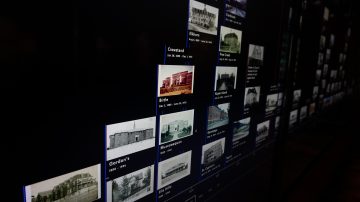
Since opening in April 2018, the Residential School History and Dialogue Centre has been working collaboratively to support transparent information practices and research, in a Survivor-centred, trauma-informed way. At its core, the Centre has been building digital technologies such as the collections website, and furthering research related to residential schools such as intergenerational trauma, Indian hospitals and the Sixties Scoop.
As part of its mandate, the Centre has positioned itself on campus as an independent research centre. Over the past year, staff have been working diligently in several areas, including:
Research and educational support
- 30+ tours
- 20+ classes
- 1,500 faculty, staff, student visitors
The Centre is actively partnering with faculties and departments across campus on curriculum and resource development, and hosted students as part of class collaborations, including: First Nations and Indigenous Studies, Allard School of Law, the Centre for Teaching, Learning and Technology, UBC iSchool, UBC Library, Anthropology, Sociology and First Nations and Endangered Languages.
Both Indigenous and non-Indigenous educators and scholars have visited the Centre as part of research projects and community presentations, highlighting the Centre as a focal point for transparent dialogue about the legacy of residential schools in Canada.
Partnerships and grants
The Centre has secured both internal and external grants to support research activities and the mandate of the Centre. Most recently the Centre was awarded a SSHRC Indigenous Research Capacity and Reconciliation grant in collaboration with UBC’s Indigenous Research Support Initiative (IRSI) for the development of an Indigenous informed information and records framework for the university and beyond.
The Centre continues to partner with other institutions such as the Legacy of Hope Foundation, Library Archives Canada, and the United Church Archives to build upon its collections, gather related records and provide information for Survivors.
Community engagements
- 400+ people
- 50+ communities
Working closely with the Indian Residential School Survivors Society and Indigenous communities, the Centre has engaged with dozens of communities to discuss the on-going work of the Centre. In addition to the Dialogues, the Centre has welcomed Indigenous Elders, scholars and community members to get critical feedback on the online systems and even the physical space inside the Centre. Speaking with Survivors and community members is critical to ensure that the Centre’s records have appropriate privacy protections, and Indigenous-informed stewardship of sensitive information. This work is highlighted in our recent exhibition on display until early September 2019.
The Centre will continue to curate Indian Residential School System records following Indigenous access protocols, support respectful and Survivor-informed dialogue, and further the narrative of Survivor and Intergenerational Survivors.
Stay tuned for updates on our mission, mandate and progress on our strategic goals.